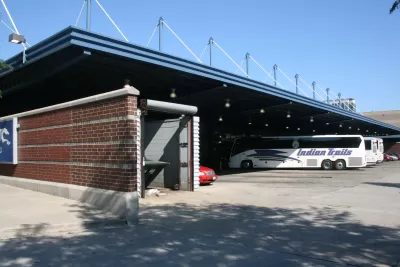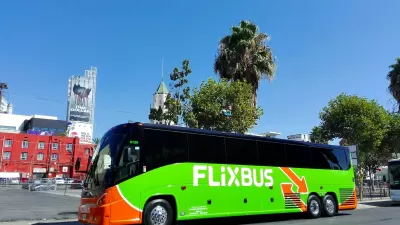The terminal, sold last year, is the only intercity bus station in the city, serving hundreds of thousands of mostly low-income travelers each year.

The only intercity bus terminal in Chicago, formerly belonging to Greyhound, could close as a result of the company’s acquisition by FlixMobility. Dan Zukowski outlines the story in Smart Cities Dive, noting that “All but two of Greyhound’s former properties were sold by September 2022, causing cities to lose enclosed bus stations and forcing riders to wait at curbside or other locations lacking waiting rooms and other amenities.”
According to a brief from the Chaddick Institute for Metropolitan Development at DePaul University, “Allowing the closure of the Greyhound Station without giving passengers an attractive alternative that is both centrally located and equipped with an indoor waiting room would make metropolitan Chicago a weak link in the national intercity bus system.” The station currently serves between 456,000 and 557,000 riders per year, according to a Chaddick estimate, with almost 400,000 more riders using curbside pickup locations, which lack protection from winter weather and heat, for Greyhound and other bus lines.
The brief calls on the city to take over operations of the bus station and keep it in service for the passengers who rely on it and explore options for expanding intercity bus service to and from Chicago.
FULL STORY: Chicago may lose its only intercity bus station, placing burden on disadvantaged travelers

Planetizen Federal Action Tracker
A weekly monitor of how Trump’s orders and actions are impacting planners and planning in America.

Congressman Proposes Bill to Rename DC Metro “Trump Train”
The Make Autorail Great Again Act would withhold federal funding to the system until the Washington Metropolitan Area Transit Authority (WMATA), rebrands as the Washington Metropolitan Authority for Greater Access (WMAGA).

The Simple Legislative Tool Transforming Vacant Downtowns
In California, Michigan and Georgia, an easy win is bringing dollars — and delight — back to city centers.

The States Losing Rural Delivery Rooms at an Alarming Pace
In some states, as few as 9% of rural hospitals still deliver babies. As a result, rising pre-term births, no adequate pre-term care and harrowing close calls are a growing reality.

The Small South Asian Republic Going all in on EVs
Thanks to one simple policy change less than five years ago, 65% of new cars in this Himalayan country are now electric.

DC Backpedals on Bike Lane Protection, Swaps Barriers for Paint
Citing aesthetic concerns, the city is removing the concrete barriers and flexposts that once separated Arizona Avenue cyclists from motor vehicles.
Urban Design for Planners 1: Software Tools
This six-course series explores essential urban design concepts using open source software and equips planners with the tools they need to participate fully in the urban design process.
Planning for Universal Design
Learn the tools for implementing Universal Design in planning regulations.
Smith Gee Studio
City of Charlotte
City of Camden Redevelopment Agency
City of Astoria
Transportation Research & Education Center (TREC) at Portland State University
US High Speed Rail Association
City of Camden Redevelopment Agency
Municipality of Princeton (NJ)





























